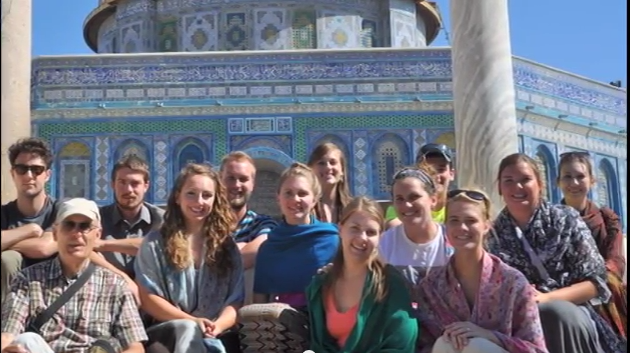
To view the documentary version of this news story, please click here .
Twelve Truman State students who traveled to Jordan and Israel with the philosophy and religion department June 2 to 30 expected to earn six credits while visiting various sites of historic and religious significance. What they didn’t expect was being thrown in the fray of the Israeli-Palestinian conflict and the kidnapping of three Israeli boys while they were in the country.
The conflict stems back to the formation of Israel as a country during 1948 after World War II. The Palestinians were relocated from their homes and the Jews were given the land now known as Israel. Both groups believe they have a legitimate claim to the land, leading to conflict between the Israelis and the Palestinians.
While the group was in Israel, they visited Israel proper, Israeli territory and the West Bank, a Palestinian territory. The group was in Israel when three Israeli teenage boys were kidnapped in Hebron in the West Bank June 12 and discovered dead June 30. The group also witnessed protests and murals indicating the Palestinians’ dissatisfaction with Israeli rule throughout the region.
Junior Aaron Gershman says the group had the opportunity, while in Jerusalem, to go on the Temple Mount, which he says is a spot of great religious significance for Jews and Muslims alike.
He says two Jews had managed to climb atop the Temple Mount and, as a result, the Palestinians were protesting. Gershman says a man approached him and told him why the protesters were gathered.
“[The man] says, ‘The Jews have taken from us everything. They have pushed us back to further than we can go. We have no other choice but to protest,’” Gershman says.
The desperation of the protestors was evident, he says. Gershman says he thought the protest was an outlet of this desperation, anger and pain. He says the protestor he spoke to seemed to hold the deep-seated anger at the heart of the Israeli-Palestinian conflict.
“At the end of [the protest], [the man] looked at me and says, ‘You know what the Jews are?’ I says no. And he says, ‘The Jews are a cancer, choking [the Palestinians] out. And you know what you do with cancer — you cut it out.’”
Junior Caitlyn Bess, who also went on the trip, says that as their excursion to Hebron neared, it became obvious that entering the city would be problematic. Their tour guide and their driver, both Palestinian, were apprehensive about going there, she says.
“The place was crawling with soldiers,” Bess says. “We as Americans could have gotten in, but we wouldn’t have had anyone to drive us because no Palestinians were going near [Hebron] unless they lived there.”
This complication changed the travel plans for the group. Bess says she was upset because she was looking forward to Hebron because of a farm the group was to visit.
Senior Erin Nyquist says although it was confusing at first, it became increasingly easy to tell when the Truman group was in Palestine and when the group was in Israel. She says she saw water tanks on the houses whenever they were in Palestine.
“[The water tanks were necessary] because Israel controls the resources, including the water that goes to Palestine and so they have the ability to turn off the water at any time,” Nyquist says.
This even affected the group at a hotel they stayed at in Bethlehem, which is in the West Bank.
“The last day we were in the hotel … there was no water in the morning,” Nyquist says. “We talked to the front desk about it and it was not out of the ordinary. [They] says sometimes there’s no water for 20 days.”
Junior Molly Turner says she noticed the inequality of resources between Palestine and Israel, namely with water supply.
“We drove past this really beautiful water park,” Turner says. “We were told that they would shut off the water in Palestine for 30 days just to make sure there was enough water to run the water park in Israel. I just couldn’t believe that.”
Turner says she hopes her conversations with people about her trip will lead to a larger conversation about how to solve the complex situation between Palestine and Israel.
“It’s not one side, it’s not the other side,” Turner says. “It’s a big giant gray area that just needs help.”
Turner says she thinks people finally are beginning to realize the problem and have some conversations about it.
“The love I felt over there from people on both sides — they want [change] to happen,” Turner says. “There were some pretty inspiring people.”
Editor’s note: Ingrid Roettgen, executive producer of TMN Television, contributed to this story.